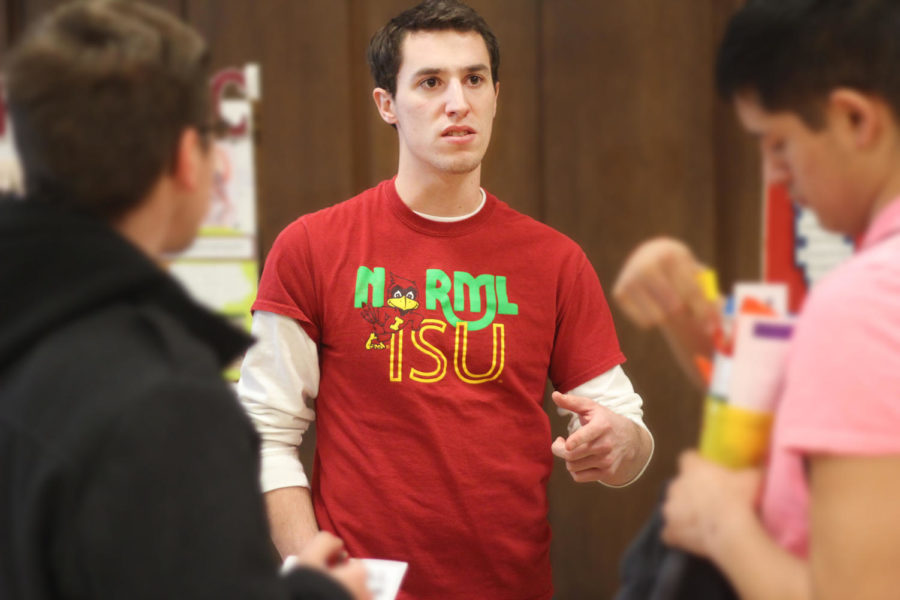ISU students claim First Amendment infringement, sue university
Mike Bankers, a junior in industrial engineering and management, talks with students about the ISU chapter of NORML. NORML, or National Organizations for Reform of Marijuana Laws, acts on campus to spread information about what the club stands for.
July 1, 2014
Editor’s note: This article has been updated to include information about similar situations at other universities. That information is from Katie Winkle at the Scripps Howard Foundation Wire.
Two ISU students are suing Iowa State and university officials, claiming their First Amendment rights were violated.
The students, Paul Gerlich and Erin Furleigh, are the president and vice president of ISU NORML, an organization that advocates for reforming marijuana laws. The organization had multiple T-shirt designs denied by the ISU trademark office.
Gerlich and Furleigh are being represented by the Foundation for Individual Rights in Education.
“ISU cannot censor certain viewpoints simply because they are controversial, dissent from the current order or express ideas that ISU administrators would rather not hear,” said Will Creeley of the Foundation for Individual Rights in Education, FIRE. “It’s [the foundation’s] mission to ensure that when students are silenced, their rights are vindicated.”
In October 2010, a shirt design that read NORML on the front with the ISU mascot Cy as the O and the phrase “Freedom is NORML at ISU” on the back with a marijuana leaf above NORML was submitted. The shirt was approved and met the standards of the ISU trademark office at the time.
According to the suit, Tom Hill, senior vice president for student affairs, and Warren Madden, senior vice president for business and finance, told Furleigh that the approval of the shirt design was revoked.
The university’s revocation of the design approval was a reaction to the complaints it received after a photo of a member of NORML holding the shirt was published by the Des Moines Register, according to the suit.
The ISU trademark office changed its “Guidelines for University Trademark Use by Student and Campus Organizations” on Jan. 16, 2013.
Under the new guidelines of the ISU trademark office, designs that promote “dangerous, illegal or unhealthy products, actions or behaviors” and “drugs and drug paraphernalia that are illegal or unhealthful” will not be approved.
The suit claims that these guidelines are “overly broad and vague” and that the vague wording of the policy allows for administrators to make judgements based on “arbitrary application” or on the basis of “the viewpoint to be expressed.”
“Any time a public university discriminates on the basis of the viewpoint expressed by a student or a student group, it raises First Amendment problems,” Creeley said. “Whether it’s NORML’s message here or the speech of any other student or student group who might wish to express a controversial or dissenting idea, the First Amendment is implicated.”
The trademark office rejected a design June 10, 2013, that stated “NORML ISU Supports Marijuana Legalization” in all capital letters across the front with a picture of a cannabis leaf. On the back, the design read “National Organization to Reform Marijuana Laws” with a smaller cannabis leaf.
In January, Hill agreed with the university’s decision. Hill was the interim faculty advisor to NORML at the time.
University spokesman John McCarroll said in an email that the university has not seen the lawsuit and could not comment on specific allegations. He said the university will review the case with the Iowa attorney general’s office and file its response with the court.
“Student organizations at Iowa State University have the right to express their views, but they can’t attribute those views to the university,” McCarroll said. “Iowa State has the right and obligation to manage the use of our university trademarks.”
Madden said that he believes the university acted correctly in this case.
NORML isn’t the only university group suing the university for free speech infringement. An Ohio University student organization called Students Defending Students, SDS, is also suing its university for First Amendment infringement. This is another case included in FIRE’s Stand Up for Speech Litigation Project.
SDS assists students with university disciplinary actions when they are accused of breaking the code of conduct. SDS made a T-Shirt which said “We’ll get you for free.”
According to a press release from FIRE, Isaac Smith and other members of the SDS were “ordered by administrators” not to wear the T-Shirt, “claiming that the slogan ‘objectified women’ and ‘promoted prostitution.'”
According to its statement, Ohio University “never directed the students or the student organization to not wear the T-shirts.” Ohio University also said no disciplinary action was taken and that administrators only discussed how the T-Shirts would be perceived.
Chicago State University and Citrus College students and faculty are also filing similar suits and are included in FIRE’s project.
Chicago State University allegedly threatened to shut down a faculty blog, “Faculty Voice,” with legal action. A Citrus College student was reportedly threatened with removal from the university for protesting NSA surveillance outside of a “free speech area” which comprises just over one percent of the campus.

















